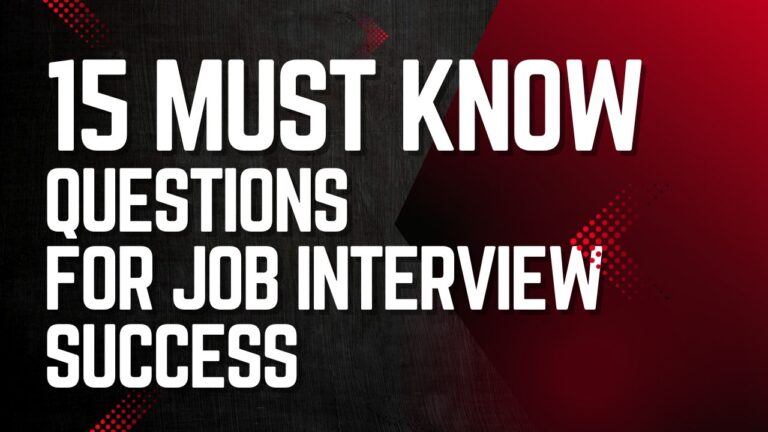25+ Cricket Player Interview Questions: Insights for Aspiring Athletes
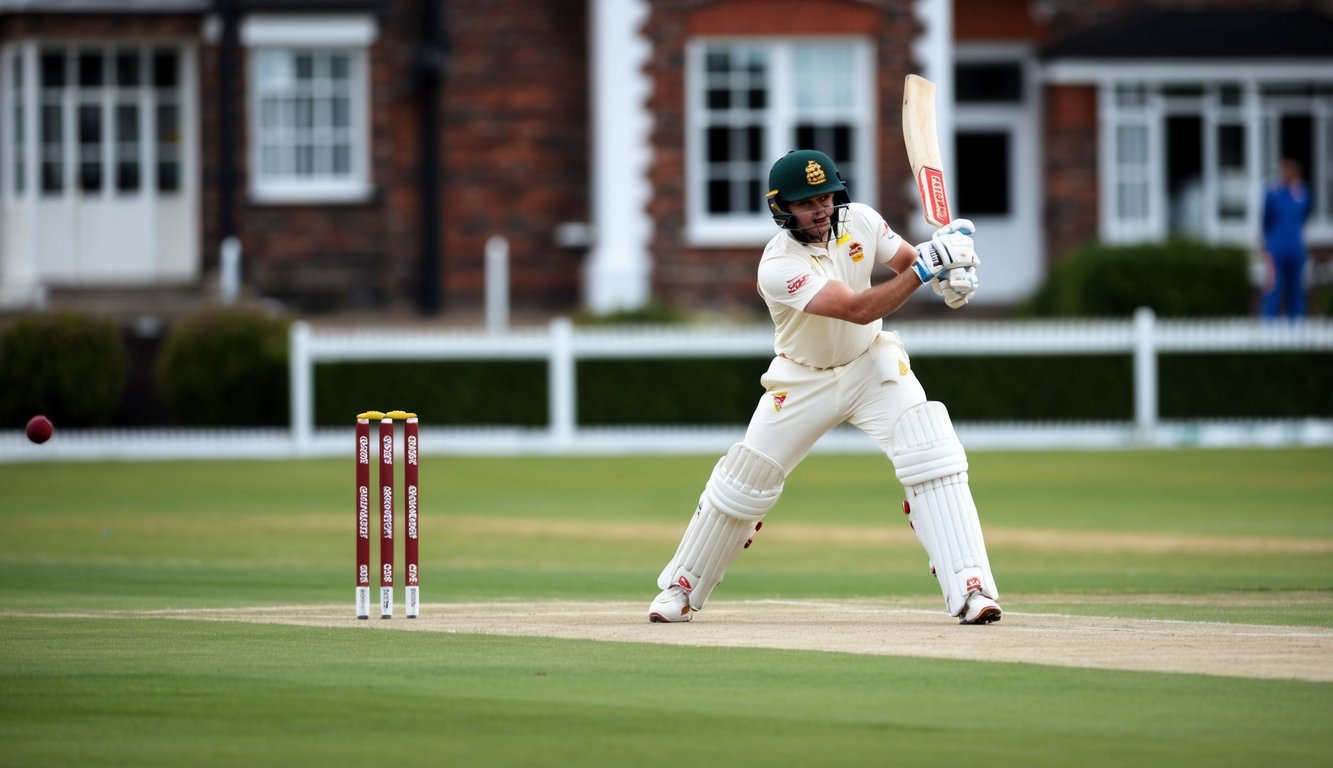
Joining a college, university, or club cricket team is an exciting step for any aspiring athlete. But before you get on the field, you’ll likely face an interview to assess not just your skills but also your mindset, team spirit, and commitment to the sport.
These interviews are a critical opportunity to showcase your passion for cricket, your understanding of the game, and your ability to be a valuable team player.
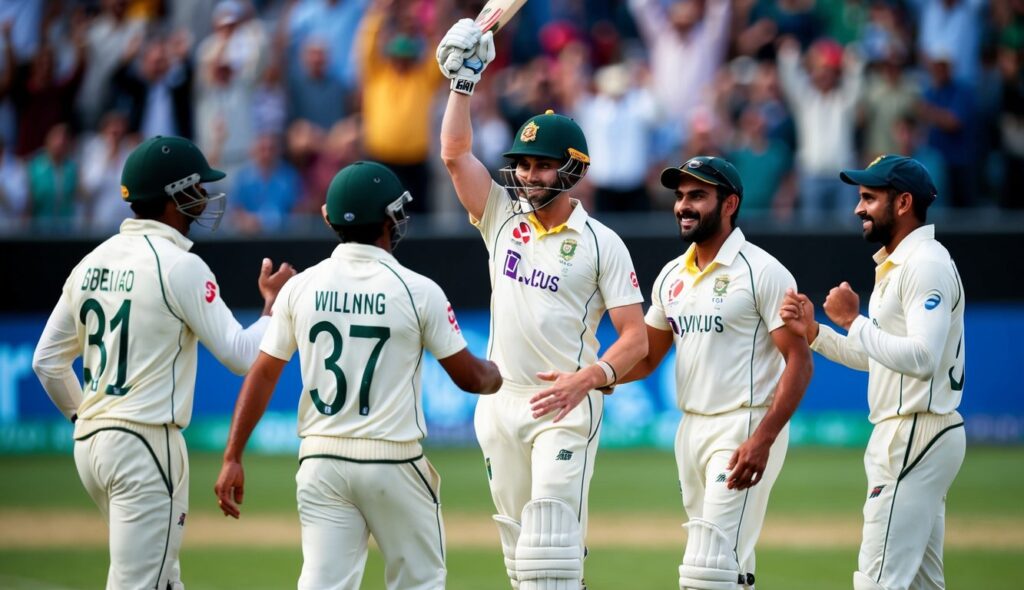
This blog post is designed to help you prepare for that moment. Whether you’re stepping into the interview room for the first time or looking to polish your responses.
These 25+ cricket player interview questions and sample answers will give you a clear idea of what to expect and how to articulate your thoughts confidently.
From questions about your playing style to how you handle pressure during crucial matches, we’ve got you covered. Our aim is to equip you with insights that reflect the qualities selectors are looking for—dedication, adaptability, and a team-first attitude.
With these tips, you’ll be ready to bowl over your interviewers and take the first step toward a promising cricketing journey!
The Essence of Cricket
Cricket is more than just a game; it’s a way of life for many. From the historic test matches that can last up to five days, to the fast-paced excitement of the T20 World Cup, cricket offers something for everyone.
In cricket, team strategy and individual skills mesh together. Whether you are a bowler perfecting your swing or a batsman finding the gaps, every role is crucial. The balance between defense and attack keeps the game thrilling for both players and fans.
When you’re exploring a coaching job at a school, college, or University, you may encounter some thoughtful questions. Here’s a sample of what you might face:
Q: How would you incorporate test cricket techniques in training? A: You should emphasize patience and technique, helping students understand the value of endurance.
Q: What strategies would you use to prepare a team for a T20 World Cup? A: Focus on agility and quick decision-making. Encourage aggressive play and strategic thinking.
Q: How do you plan to instill a sense of cricket history in your players? A: Share stories of iconic matches and players to inspire and educate about the game’s heritage.
Cricket continues to captivate people across the world, bringing diverse communities together in the spirit of competition and sportsmanship.
Becoming a Cricketer
Becoming a successful cricketer involves a mix of natural talent, hard work, and right guidance. Young players often start with a strong interest in the sport and are inspired by professional cricketers, join cricket clubs for formal training, and focus on fitness and diet to achieve their goals.
Here’s how you can set yourself on the path to cricket success.
Early Beginnings and Childhood
Many cricketers start playing as children. If you show an interest in cricket early, practice with friends or family is a good way to begin. Playing in the backyard, parks, or open fields can help you develop basic skills.
Encouragement from family and teachers can also nurture your love for the game. Engaging in school cricket teams gives you exposure to more structured forms of play. At this stage, focus on having fun while learning the basics.
Joining a Cricket Club
Joining a cricket club is essential for any aspiring cricketer. Clubs provide professional coaching, proper facilities, and teammates who share your passion.
You get opportunities to play in local matches and tournaments, which can improve your skills and experience.
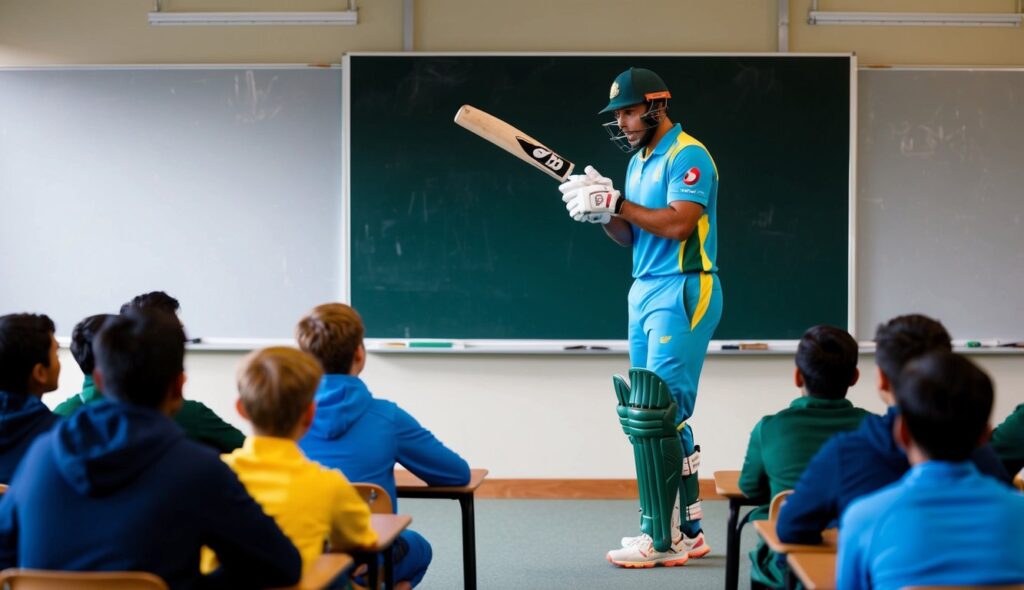
Find a club that suits your location and level. Coaches there can guide you technically and help refine your playing style. This formal training is a stepping stone towards greater achievements in cricket.
Role Model Influence
Having a role model can significantly impact your cricket journey. Many young players look up to professional cricketers and learn by watching them play. Observing their techniques and dedication can inspire you to improve your game.
Listening to interviews or reading about their experiences can offer valuable lessons. Role models show you what’s possible with hard work and perseverance, motivating you to reach your own goals.
National Team Aspirations
Dreaming of playing for the national team is common among aspiring cricketers. To get there, you need dedication and consistent performance at club and regional levels. It’s important to participate in competitive matches to gain recognition.
Understanding the selection process for the national team can guide you in preparing yourself better. Networking with coaches and selectors and keeping abreast of opportunities like trials can open doors for you.
Physical Fitness
Physical fitness is crucial in cricket. The sport demands strength, stamina, agility, and quick reflexes. Regular exercise, including strength and endurance training, can enhance your performance on the field.
Engage in daily workouts tailored to cricket, focusing on building muscle and improving flexibility. Staying fit reduces the risk of injuries and ensures you remain competitive in the game. Joining fitness programs or working with a trainer can be beneficial.
Nutrition and Diet
Good nutrition is important for maintaining energy levels and promoting recovery after intense play. Eating a balanced diet rich in proteins, carbohydrates, and healthy fats supports your growth and performance as a cricketer.
Stay hydrated and ensure you get enough vitamins and minerals. Avoid junk food and focus on whole foods like fruits, vegetables, lean meats, and grains. Consulting a nutritionist can help tailor a diet plan that meets your specific needs and goals.
Questions for Cricket Player Searching for a Job
When a cricket player is searching for a coach, it’s important to ask questions that help assess the coach’s qualifications, coaching style, and compatibility with the player’s goals. Here are some questions that can be useful:
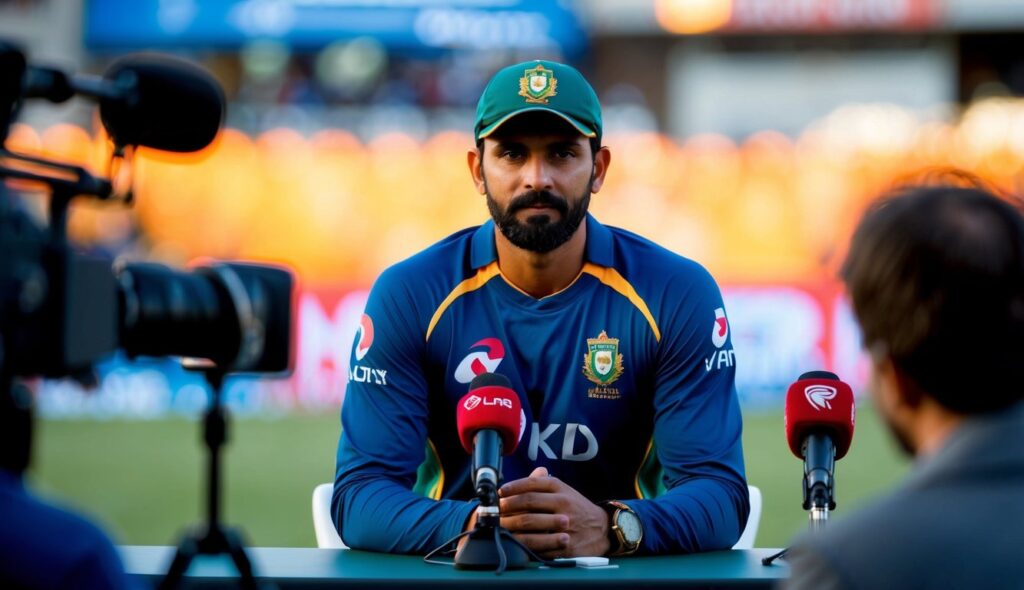
Coaching Experience and Background
- What is your coaching experience, and how long have you been coaching cricket?
- Have you worked with players at my skill level before?
- What qualifications or certifications do you have in cricket coaching?
- Can you provide references from players or teams you’ve coached?
Coaching Philosophy and Style
- How would you describe your coaching philosophy?
- What is your approach to skill development and improvement?
- How do you tailor your coaching to fit the individual needs of players?
- What techniques do you use to assess a player’s strengths and weaknesses?
Training and Development
- What does a typical training session look like?
- How do you incorporate fitness and conditioning into your training programs?
- What drills or exercises do you find most effective for skill enhancement?
- How do you approach mental conditioning and strategy in cricket?
Communication and Feedback
- How do you provide feedback to players?
- What is your preferred method of communication with players?
- How do you handle conflicts or disagreements with players?
Goals and Expectations
- How do you set goals for your players?
- What are your expectations from me as a player?
- How do you measure progress and success?
Availability and Commitment
- What is your availability for training sessions and matches?
- How do you balance coaching with other commitments?
Additional Considerations
- How do you stay updated with the latest trends and techniques in cricket?
- What are your thoughts on teamwork and team dynamics?
- How do you handle player injuries and recovery?
Closing Questions
- What do you consider your biggest success as a coach?
- Why do you think you would be a good fit for me as my coach?
List of Interview Questions for Cricket Player (with Sample Answers)
Here’s a list of 10 interview questions for a cricket player, along with sample answers that reflect how a player might respond:
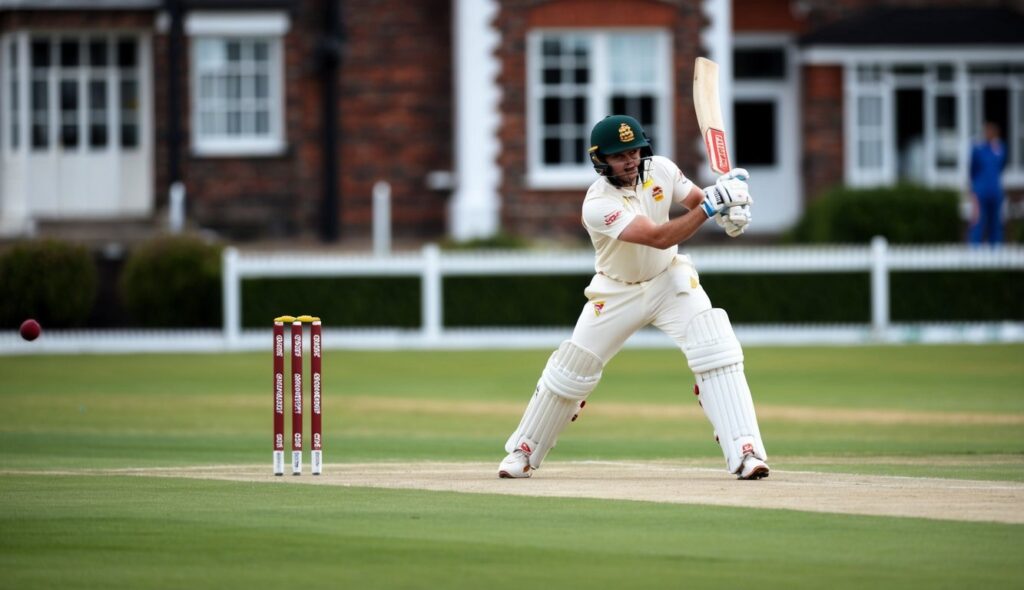
1. What inspired you to pursue a career in cricket?
Sample Answer: “I’ve loved cricket since I was a child. Watching my favorite players on television and playing with friends in the park ignited my passion. As I grew older, I realized I wanted to take it seriously and make a career out of it.”
2. What do you consider your greatest strength as a cricketer?
Sample Answer: “I believe my greatest strength is my ability to remain calm under pressure. Whether it’s a tight game situation or a crucial moment in a match, I focus on my skills and trust my training to guide me through.”
3. How do you handle setbacks or failures in your career?
Sample Answer: “Setbacks are part of any sport. I try to learn from each experience, whether it’s a poor performance or an injury. I analyze what went wrong, seek feedback, and use it as motivation to improve for the next opportunity.”
4. Can you describe a particularly memorable match or performance?
Sample Answer: “One of my most memorable performances was during a local final where I scored a century and took three wickets. The adrenaline of playing in front of a supportive crowd and helping my team win was unforgettable.”
5. How do you prepare mentally and physically for a match?
Sample Answer: “Mentally, I visualize my performance and set specific goals for the game. Physically, I follow a rigorous training regimen, including fitness workouts and skill drills to ensure I’m in peak condition.”
6. What role do you play in your team’s dynamics?
Sample Answer: “I see myself as a team player and a motivator. I always encourage my teammates and try to maintain a positive atmosphere, especially during tough times. I believe that good team dynamics are crucial for success.”
7. How do you approach skill development in your game?
Sample Answer: “I focus on continuous improvement by setting specific goals for my batting and bowling techniques. I regularly practice with a coach and seek feedback to refine my skills and adapt to different conditions.”
8. What are your long-term goals in cricket?
Sample Answer: “My long-term goal is to play at the highest level, whether that’s representing my country or playing in prestigious leagues. I also aspire to contribute to the development of young cricketers by sharing my knowledge and experiences.”
9. How do you cope with the physical demands of the game?
Sample Answer: “I maintain a strict fitness routine that includes strength training, cardio, and flexibility exercises. Proper nutrition and rest are also key components of my regimen to ensure I can perform at my best.”
10. What advice would you give to aspiring cricketers?
Sample Answer: “My advice would be to stay dedicated and passionate. Work hard on your skills, be open to learning, and don’t get discouraged by failures. Surround yourself with supportive people who believe in your potential.”
Frequently Asked Questions

These questions give you insight into a cricket player’s journey, daily life, and key moments in their career. They touch on inspirations, training, challenges, and memorable experiences.
What inspired you to become a professional cricket player?
Your journey into professional cricket likely started with a passion sparked in childhood. Role models, whether they were famous players or local heroes, might have played a big part. Sometimes, it’s personal experiences or pivotal moments that ignite this dream.
Can you walk us through your daily training routine during the season?
In-season training often involves a mix of physical exercises, skill drills, and mental preparation. You might focus on specific areas like batting or bowling, along with fitness workouts to improve strength and endurance. Balance between rest and activity is crucial.
What do you consider to be your greatest strength as a cricket player?
Every player has unique skills. Whether it’s your batting technique, bowling speed, or strategic thinking, your strengths contribute significantly to your team. Identifying these helps you leverage them effectively in games and practice sessions.
How do you prepare mentally and physically before a big game?
Preparation before a big game includes fine-tuning your skills and getting into the right mindset. Visualization techniques, staying calm, and a strict routine are part of the process. Physical warm-ups are essential to ensure you’re game-ready.
How do you handle pressure situations in a match?
Pressure comes with the game, and handling it is key to performing well. You might use techniques such as deep breathing, focusing on the task at hand, and drawing from past experiences. Staying positive and confident helps maintain composure.
What has been the most memorable match of your career so far?
Reflecting on memorable matches often brings stories of challenging opponents or personal milestones. It could be a match where you played a pivotal role or one that taught you significant life lessons. These moments define your career and passion for cricket.
All the Best !




